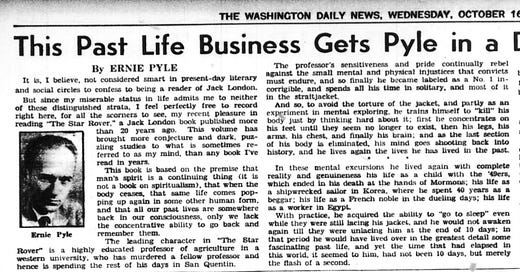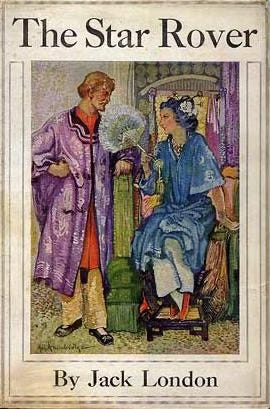THE WASHINGTON DAILY NEWS — WEDNESDAY, OCTOBER 16, 1935
This Past Life Business Gets Pyle in a Deep, Brown Study
By ERNIE PYLE
It is, I believe, not considered smart in present-day literary and social circles to confess to being a reader of Jack London.
But since my miserable status in life admits me to neither of these distinguished strata, I feel perfectly free to record right here, for all the scorners to see, my recent pleasure in reading The Star Rover, a Jack London book published more than 20 years ago. This volume has brought more conjecture and dark, puzzling studies to what is sometimes referred to as my mind, than any book I’ve read in years.
This book is based on the premise that man’s spirit is a continuing thing (it is not a book on spiritualism), that when the body ceases, that same life comes popping up again in some other human form, and that all our past lives are somewhere back in our consciousness, only we lack the concentrative ability to go back and remember them.
The leading character in The Star Rover is a highly educated professor of agriculture in a western university, who has murdered a fellow professor and hence is spending the rest of his days in San Quentin.
The professor’s sensitiveness and pride continually rebel against the small mental and physical injustices that convicts must endure, and so finally he became labeled as a No. 1 incorrigible, and spends all his time in solitary, and most of it in the straitjacket.
And so, to avoid the torture of the jacket, and partly as an experiment in mental exploring, he trains himself to “kill” his body just by thinking hard about it; first he concentrates on his feet until they seem no longer to exist, then his legs, his arms, his chest, and finally his brain; and as the last section of his body is eliminated, his mind goes shooting back into history, and he lives again the lives he had in the past.
In these mental excursions he lived again with complete reality and genuineness his life as a child with the ‘49ers, which ended in his death at the hands of Mormons; his life as a shipwrecked sailor in Korea, where he spent 40 years as a beggar; his life as a French noble in the dueling days; his life as a worker in Egypt.
With practice, he acquired the ability to “go to sleep” even while they were still lacing his jacket, and he would not awaken again till they were unlacing it at the end of 10 days; in that period he would have lived over in the greatest detail some fascinating past life, and feel that time had elapsed in this world, it seemed to him, had not been 10 days, but merely the flash of a second.
He never got back to the days when he was a mud turtle, but he felt that with sufficient practice he could get back that far. They took him out, I regret to report, and hanged him before he got that far.
I cannot help but wonder, in those vague interludes when we sit alone and think weird things to ourselves, if there is not something to this past life business.
As Jack London says, all of us surely have had those uncanny flashbacks—a face in a crowd, an overheard remark, a little tableau or group of actions that we see—and we have that puzzling feeling that somewhere we have seen, or heard, or done that thing before. And yet nothing in our memory can bring to realization when or where or how it was.
London thought those moments are swift glimpses of our former lives, and that’s as far as most of us can ever go, but with intense concentration and devotion to a mental discipline approaching true self-hypnosis, London thought we could recapture and relive, in our minds, all those experiences.
When I get rich, when I expect to buy a house way down South, and lean a chair back against the sunny side, and just sit around for six weeks, trying to get back to the days when I was Genghis Khan, or a billy goat, or maybe Cleopatra. And if I don’t succeed, at least I’ll have had a mighty fine rest.
💛 **Enjoyed this post?** Your support helps us continue to transcribe and promote Ernie’s work. Please click the link below to donate.
https://www.erniepylefoundation.org





